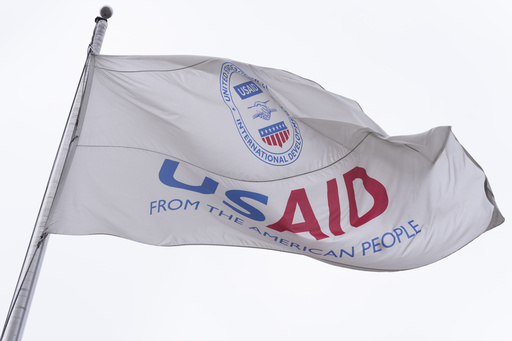
In discussions witnessed by leaders of North America, Canadian Prime Minister Justin Trudeau and Mexican President Claudia Sheinbaum have reached an agreement with U.S. President Donald Trump to temporarily suspend imposing tariffs for at least 30 days. In contrast, Trump’s tariffs on China remain scheduled to take effect on Tuesday.
Meanwhile, following Elon Musk’s announcement that he had convinced Trump to shut down the U.S. Agency for International Development (USAID), staff members of the agency have been told to avoid the agency’s headquarters in Washington D.C. Musk, now heading the new Department of Government Efficiency, has been empowered to scrutinize federal operations broadly.
Here’s the latest on key developments:
Buckley Space Force Base in Colorado will serve as a command center for immigration enforcement operations rather than a detention facility for undocumented immigrants. U.S. Representative Jason Crow visited the Aurora base and confirmed it will function as a hub for federal immigration agencies rather than housing migrants. “The facility is indeed operational for Homeland Security and ICE activities, but it isn’t a detention site,” Crow explained. Earlier claims by the Department of Defense about processing migrants on the base had raised alarms among local officials, but Crow found no evidence of migrants being accommodated on-site.
During his campaign, Trump suggested that Aurora was plagued by a Venezuelan criminal gang, which local officials have vehemently contested as exaggeration.
In an unexpected move, Republican Senator Bill Cassidy has joined Democrats in criticizing Trump’s freeze on foreign aid, particularly its adverse effects on programs like the President’s Emergency Plan for AIDS Relief (PEPFAR). Cassidy, a former physician, indicated that despite a waiver intended to protect humanitarian efforts, aid is still stymied on the ground in Africa. “PEPFAR embodies soft power and has broad bipartisan support; this halt in service is unacceptable,” he stated emphatically.
Senator Jim Risch, Chairman of the Senate Foreign Relations Committee, expressed his endorsement of Trump’s controversial decision to consolidate USAID under the State Department. Risch noted that various administrations have considered this merger since the launch of USAID, asserting, “The reorganization can enhance our national security posture.”
Senate Democratic Leader Chuck Schumer has sounded alarms about the potential risks from Musk’s DOGE gaining access to sensitive U.S. Treasury systems. Schumer voiced profound concerns about the implications for citizens’ private data, declaring that “Musk’s administration has risked nearly every American’s financial information.” He has called for immediate revocation of this access.
Expressing discontent with the current administration, Democratic Senator Patty Murray claimed, “The Trump administration represents the most corruption we have witnessed in history,” underscoring worries about potential funding cuts for essential programs. She urged her Republican colleagues to unite against Musk and Trump’s impending cuts to crucial federal support.
In a recent organizational move, Secretary of State Marco Rubio appointed Peter Marocco—known for his controversial tenure in Trump’s first term—to oversee USAID. Marocco faced previous backlash from staff due to his beliefs in cutting programs, which caused disruptions within the department. His new appointment follows the removal of senior officials, suggesting a push to overhaul the agency drastically.
As discussions surrounding tariffs and border security unfolded, Trump announced a one-month deferral on tariffs aimed at Canada and Mexico while both nations agreed to fortify border enforcement. On social media, Trudeau affirmed their collaborative commitment, signaling that they aim to work together on security matters soon.
Democrats have also spotlighted how Trump’s tariffs could increasingly burden consumers, with New Hampshire Senator Maggie Hassan indicating that tariffs on heating oil would elevate costs substantially for her state. Schumer provided projections indicating that new tariffs could add over $1,200 to annual expenses for the average American family, emphasizing that this impact ripples through everyday products and services.
As operations within USAID now face heightened scrutiny and large-scale alterations, the agency was originally formed under President John F. Kennedy to provide humanitarian assistance globally. Recent shutdowns of aid programs are inciting distress among various organizations reliant on U.S. support.
In Hawaii, Senator Brian Schatz has confirmed intentions to halt any of Trump’s State Department nominations until the administration retracts its recent USAID changes, marking a significant escalation in tensions surrounding Trump’s executive decisions.
The situation continues to evolve, particularly regarding potential trade wars and their repercussions, as economic indicators reflect growing uncertainty in response to proposed tariff measures. Wall Street noted a drop in market confidence as the threat of tariffs remains a pivotal concern, spurring further impacts on trading activities.
The interplay between U.S. political maneuvers, tariff strategies, and responses from both Canada and Mexico introduces a complex framework for upcoming negotiations amid the strengthening calls for re-evaluating the national security implications of foreign aid and trade policies.
As the Trump administration navigates these turbulent waters, dialogues surrounding issues like border security, foreign aid, and the potential for a renewed focus on geopolitical relationships will remain vigorously contested in Congress and among other stakeholders involved.
In a series of remarks, Trump hinted at intentions to reclaim the Panama Canal from Chinese control if deemed necessary, asserting a belief that U.S. discussions with Panamanian officials must yield more favorable agreements.
Concerns are raised that amidst these international dealings, internal political struggles will dominate, especially as the effects of tariff strategies reverberate across various sectors of the economy and international relations continue to fluctuate.

